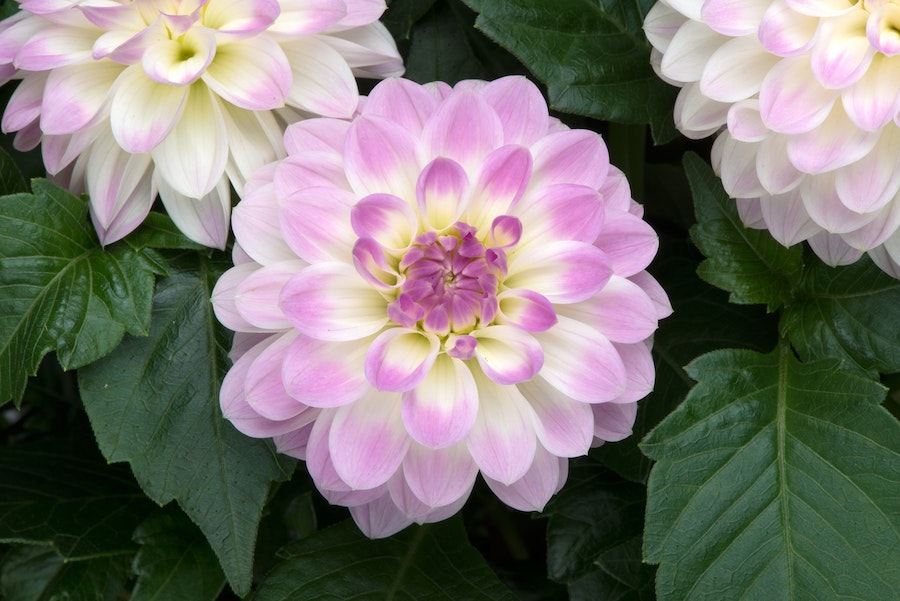5 traditional plants making a comeback
Traditional plants are making a comeback – and apparently, it’s largely because gardeners are seeking comforting old favourites due to Brexit.
According to Wyevale Garden Centres’ 2019 garden trends report, gardeners are opting for ‘tried and tested’ varieties during these unsettled times, from bedding classics that deliver a show for months, to traditional blooms that offer attractive cut flowers.

Dahlias are back in vogue
“In times of uncertainty, people seek familiarity,” says Mark Sage, Wyevale’s head of horticulture. “There’s some great breeding work being done with hydrangeas. Dahlias can be grown in a 9cm pot on the windowsill, or in big drifts in borders.
“The popularity of mainstay plants such as lavenders and begonias is huge. English lavender – hidcotes – are getting big momentum, as well as lots of other angustifolia varieties.”
Here are five traditional favourites that have bloomed in popularity during these uncertain times…
1. Hydrangeas

Hydrangea ‘Runaway Bride’ looks great in a pot
They might have once seemed really outdated, but hydrangeas have made a comeback, with new varieties coming on to the market – such as ‘Runaway Bride’, a white variety which won Plant of the Year at Chelsea Flower Show last year.
Hydrangeas like a bit of shade and are acid-loving, so plant them in ericaceous compost. Flower colour is influenced by the soil acidity, and if you want your hydrangeas blue, you may need to add hydrangea colourant, a mixture of iron and aluminium.
2. Dahlias

Dahlia Gardenetta ‘Iceball’
Sales of dahlias were up 23% in 2018, with more than 200,000 plants arriving in centres in 2019. They’re trending on Instagram too, with Wyevale Garden Centres’ social media engagements up 104% for dahlia content in 2018. New shades for 2019 include ‘Iceball’ (lemon yellow and white) and ‘Lavender swirl’.
View this post on InstagramWhen only dahlias will do #flowerreport #flowers #dahlia #devonportpark #plymouth #uk
New varieties of the popular ‘Gardenetta’ dahlia series are spectacularly coloured big blooms on plants compact enough to be grown in containers, perfect for space-starved gardeners.
Bedding varieties are smaller than the types grown for show or cutting and are ideal for pots, as they often have colourful foliage as well as flowers. Dry tubers are often sold in mixed packs, so if you want a definitive colour, buy them in flower. If you are planting tubers in pots, dahlias will need planting in spring for a lovely summer display.
3. Heathers

Heather looks great in a pot or in an alpine bed
Heathers are abundant in garden centres almost year-round, starting with the white and purple winter-flowering varieties of Erica carnea, to the bell-shaped flowers of Cornish heather, Erica vagans, which flowers in summer to Erica tetralix, a low-spreading grey-leaved evergreen type bearing clusters of lilac-pink, white or magenta flowers from midsummer to mid-autumn.
Again, heathers prefer acid soil, so plant them in ericaceous compost in bold drifts.
3. Lavenders

Lavender offers colour and fragrance
English lavender has never really gone out of fashion, thanks to its eye-catching spikes of blooms, traditionally in purple but also available in pink and white. It’s low-maintenance, doesn’t need compost added to the soil when planting and is drought-tolerant, so will survive longer than many other plants subjected to full sun for most of the day during long dry summers.
Look out for English lavender or certainly lavender which has been grown in the UK, because of the risk of Xylella, a bacteria which has been found in other parts of Europe and reduces plants’ ability to take up water, causing leaf scorch, die back and, in some cases, plant death.
Lavender’s great for low hedging, creating a framework for ornamental kitchen gardens (potagers) and is also a magnet for bees.
5. Begonias

The sizzling Begonia boliviensis is such a cool plant
They have long been considered the musty, fusty bedding plants favoured by grannies nationwide, but again, new breeding has resulted in much more interesting varieties in recent years – including Begonia ‘Fragrant Falls Improved – Apricot Delight’, a trailing variety which offers cascades of apricot blooms which will flower well into autumn.
But the coolest begonias are the species types, wild ones from Brazil, Bolivia, Japan and China, which have such diverse architectural forms you’d never recognise them as a begonia at all.

This Begonia ‘Bossa Nova Night Fever Papaya’ looks great in a pot
Many of them will provide interest in shady corners, where other plants will flag. Try the stunning Begonia boliviensis, whose brilliant orange flowers look great trailing out of a pot – but make sure you put it in a frost-free place over winter.
Begonias like moist soil, but don’t waterlog them. Plant them in rich, free-draining soil. If your soil is heavy, add grit to aid drainage. Feed them regularly throughout the summer and keep them in a fairly shady spot.
The Press Association
Latest posts by The Press Association (see all)
- 5 new books to read this week - November 23, 2024
- 3 easy Mary Berry recipes to make this season - November 22, 2024
- In Pictures: Party stalwart kept New Labour in touch with traditional supporters - November 21, 2024
- 6 easy indoor exercises to try this winter – and why they are good for you - November 19, 2024
- Martin Clunes: I can’t afford to retire – I’ve got too many horses - November 19, 2024





















